Authors On Covid: Chronicles from Across America
A couple of weeks ago, as I sat on our back deck enjoying my Manhattan, my mind went to how my life had changed because of this terrible virus. My wife, Linda-Marie, had taken what was happening much more seriously than I right from the beginning, and had us stocking up on essentials long before most other people. An extra carton of laundry soap here, an extra bottle of disinfectant there and yes, always an extra package of toilet paper. So, because of her wise diligence, we have been riding the "Stay at Home" rules pretty well. But that's just the essential supplies side of things. The emotional side hasn't been so smooth.
Every morning I torture myself by reading our local paper and the NYT. Even before the Coronavirus hit, the amount of horrendous news was overwhelming, supposedly civilized human beings bombing and shooting innocent people all over the world and all of us desecrating this sacred planet. I had become numb to it all and it shames me. But now we add to that already poisoned soup another ingredient, a deadly virus that kills everyone, for no reason at all.
I was also thinking about my friends. Because of my career in publishing and bookselling, I have many friends who write, some for a living, some for a little extra money; some are extremely well-known, some not as much, but all love their craft. "How are they doing?" I wondered, taking another sip, trying to get in a better mood. "I bet a lot of other people would also be interested in learning how some of their favorite authors are doing in these times. And who better to describe the experience of life during a pandemic than writers?"
That's what sparked this post.
I asked many of the authors I've featured in my blog to share their thoughts on the virus and how it is affecting their lives. You'll read the harrowing story of a COVID-19 survivor, hear from a writer who rations his alcohol and cigarettes while avoiding other people, journey to the grocery store with a writer who looks in vain for flour and canned tomatoes, and join a writer on his farm, where he is hunkered down with his family "catching salamanders, making campfires, and watching the moon rise." One writer lets us peek into her daily journal, seeing her intimate thoughts, and another, who hasn't been able to write in years, was inspired to open up, and reads us a beautiful poem by poet Robin Beth Schaer for us to reflect on.
I hope you find company and some ease in their stories.
The Writers:
TD Allman
Leif Enger
Cornelia Funke
Will Harlan
Patti Callahan Henry
Sheri Holman
Frances Itani
Leonard Pitts, Jr.
Terry Roberts
JC Sasser
Carter Sickels
Bob Shacochis
John Shore
George Singleton
Laura Lee Smith
Tiffany Quay Tyson
Sheri Holman
NYC
NYC

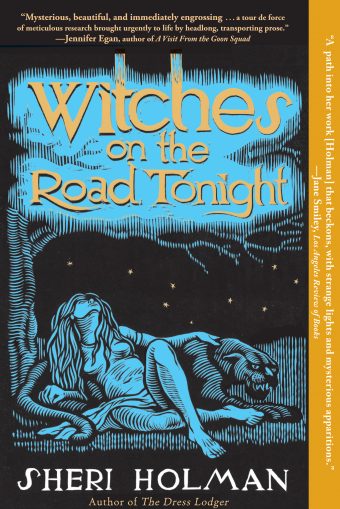
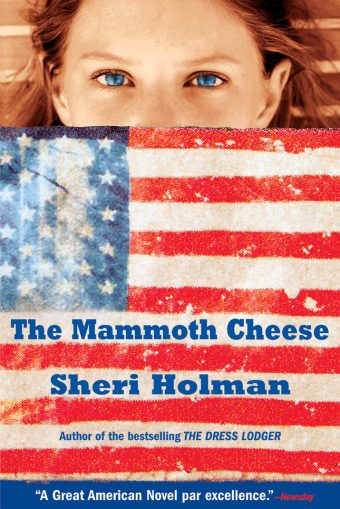
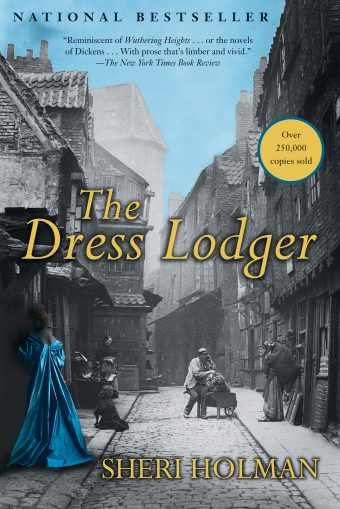

I have some great news to celebrate.
I've been out of commission for about three weeks now. On March 23rd, I started running a persistent fever between 101-103 that wouldn't come down even with Tylenol. Chills, headache, excruciating muscle and joint pain. I got all the nasty gastric symptoms first and lost a lot of fluids so, on March 30, my doctor sent me to the ER. (I'm a type 1 diabetic and dehydration is especially dangerous for us). I was put in the respiratory isolation ward, given an IV, and sent home with paperwork for COVID 19. They didn't give me the test, but I definitely had it; they told me they were reserving tests only for patients being admitted into the hospital. There were probably 50 people on my ward, all of us assumed to have it too, none of us being tested, so you can begin to imagine the undercount of this disease.
The next day my fever came down and I thought I was better. But La Covide 19 is a sneaky little bitch and pretty soon the fever was back up -- I completly lost my sense of taste and smell, and I was coughing and struggling to breathe. My amazing cousin Meredith had mailed me an inhaler which probably saved me from going back into the hospital. And later the NYU telehealth doctor prescribed a nebulizer and z-pack which has finally broken things up in my chest.

I am so beyond grateful to my mom and aunt and sister and step-siblings and cousins. I can't begin to describe the outpouring of love and support from my oldest friends and my beloved work friends and new friends whom I can't wait to get to know outside of this time of crisis.
The lesson here: Please stay home. Please be safe. This is far and away the sickest I've ever been in my life. For nearly two weeks I couldn't even get out of bed. I'm still coughing and probably will be for a long time. And I'm one of the lucky ones.

With love and gratitude. S
Leif Enger
Minnesota
Minnesota

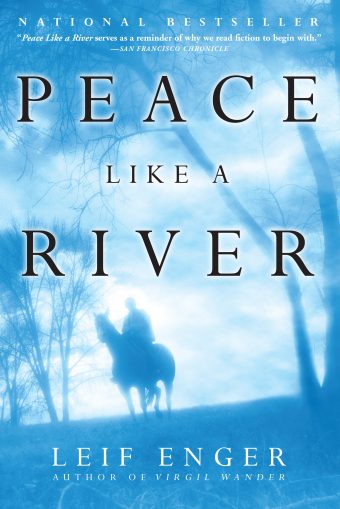
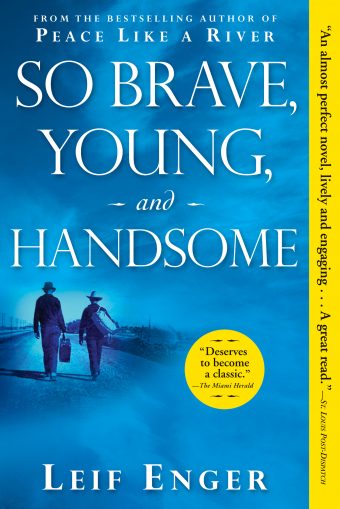
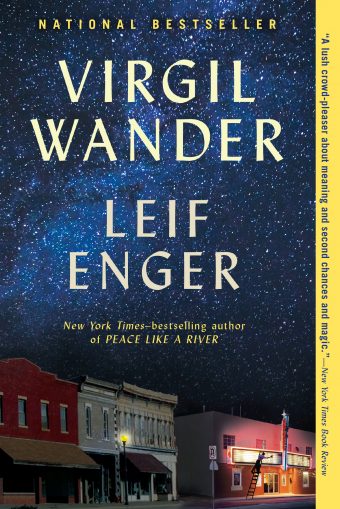
Positively 4th Street
Robin and I live in an old neighborhood in east Duluth. The
University is at the top of the hill, Lake Superior at the bottom, our house
exactly between the two - halfway up or halfway down. It’s a neighborhood of
creaky houses inhabited by people who, like us, are driving less and walking
more.In the evenings, we’ve fallen into British mysteries - Broadchurch, Endeavor, the Gently/Vera/Foyle triumvirate. They are Tater Tot Hot Dish in which the reprobates get justice instead of high office. When we happen across a character or personality we especially enjoy, one of us is likely to say: why doesn’t that person just move in here on 4th Street? The gruff old copper George Gently, played by Martin Shaw - there’s a fellow who keeps a social distance, but when something is amiss, you’d want that man around. Or James May, the wry presenter of shows about cars and toys and the wonders of Japan - it’s easy to imagine James standing on any 4th Street porch, sipping a cup of Bovril. And if one of these days I go for a walk and don’t return, it’s Vera Stanhope I’d want putting her nose to the ground, up and down the alleyways until my wrecked self comes to light - Vera who could say to Robin, I’m sorry pet, but you’ll soon be all right.
Here now, have a cup of
tea.
George Singleton
South Carolina




Frances Itani
Canada
Canada




But while I’m dithering and struggling with that one, here are a few of my recorded activities, below.
These include ZUMBA, which I love. And I removed my juggling balls from a drawer and set them on a table, but they remain on the table, untouched. And I do manage to get outside to walk a mile and a half every day.
 |
| And here’s the cleared office space where I actually dance! |
 |
| A daily pastime, below. Also, an earlier novel of mine that includes experience with a different pandemic, the big one in 1918. |
In the grocery store, when I did venture out, in one aisle a trickled layer of white covered all of the empty flour shelves. Is everyone making bread? And what are people doing with tomatoes? Hundreds of cans of tomatoes, gone, gone, gone. Not a single one left. A young woman shopping in the same aisle said: “Whoever bought up all those tomatoes will end up getting what they deserve.”
I wondered if that was her way of formulating a curse.
 |
| Sometimes, I find myself cooking...baking...instead of writing. Here is my minestrone, 6 quarts. A soup I have been making for 50 years and which my family calls Swamp Soup. |
When I saw how stressed the clerks at the cash registers were — even though they’re behind thick, high plastic barriers — I went out to the parking lot, sat in my car and cried.
There’s a distinct tendency to experience a global restlessness. To wander room to room, check on friends by email or facetime, ensure that we’re all present and accounted for. And when anxiety creeps in, a tendency to fritter away time. But let’s not be bleak!
Supply of dark chocolate getting low. I might have to go out again after all. And milk and cream running low. My husband found a dozen flimsy paper masks in our first-aid drawer; these might be better than no masks. As we are both in a high-risk age group maybe we’ll have some of our groceries delivered.
How thankful I am — especially as a former health professional, myself — for all the women and men ‘out there,’ doing their jobs in dangerous conditions.
But all is not lost! I have a new novel coming out in August 2020. The main theme circles around grief, as told through the stories of 6 people (and a parrot!) who come together as strangers and begin to connect in unexpected ways. Until two weeks ago, I was fully occupied with proof-reading, working with the editorial and production teams at HarperCollins — who now inform me that they’re ready to send the ARC out across country.
Warmest regards to everyone, from Ottawa, Canada — where I stand on my condo balcony to see if I can spot a human below. And where I search for Spring!
Frances
Leonard Pitts, Jr.
Washington DC




The other day, I threw my wife a “virtual party” for her birthday - and surprisingly enough, a good time was actually had by all.
 |
| Leonard's screen shot of the birthday party. |
N. John Shore, Jr.
North Carolina
North Carolina

 |
Here's the view of Cat I will miss so terribly when her workplace is once more miles away.
|
Patti Callahan Henry
Alabama
Alabama




Will Harlan
North Carolina
North Carolina


Life goes on, even in a pandemic. I delivered four baby
goats last week.
 |
| One of three new members of Will's family. |
 |
| Will Harland's farm |
 |
| The farm from above |
Terry Roberts
North Carolina
North Carolina



My experience “sheltering at home” during the past few weeks
has been mostly pleasurable, so far. My wife, Lynn, and I are relative newlyweds
of 18 months and so enjoy the time we spend alone together in a house high on a
mountainside outside Asheville, North Carolina. Our sense of being blessed is
compounded by the fact that no one in our family has fallen sick thus far.
 |
| Terry's view. |
Tiffany Quay Tyson
Colorado
Colorado


I miss the small things: walking to a neighborhood restaurant on Friday nights, yoga classes, happy hours, tennis. I miss getting together with my mother for lunch or dinner or shopping. I miss chatting with my neighbors without having to shout from a distance and through a mask. I adjust. I take yoga classes online. I run until we’re told to wear masks. I discover I cannot run while wearing a mask, so I take long walks instead. I talk my husband into doing Pilates with me in our living room. I call my mother and we chat about what we’re eating, what we’re watching, what we’re reading. I take naps with the dog. Sometimes the cat joins us.
He keeps shaking hands with all those contestants and I know his immune system is compromised. My husband reminds me that these episodes were taped weeks earlier. But that’s the problem, I say. We should have already been guarding against this. We didn’t act soon enough.
John Prine dies. I listen to his music and think about seeing him perform, back when I worked at Austin City Limits. My husband and I were supposed to see him in concert last year, but the performance was postponed. We couldn’t make the rescheduled date. We missed our chance.
I’m reminded that John Prine was a mailman before he made a living writing songs. Recently there’s been talk of letting the postal service fail. It’s one more thing to be angry about and I am. But then we don our masks, pull on our shoes, and take the dog for yet another walk. In Denver, the daffodils are blooming and our apple trees are starting to bud. The sun is shining. The neighbors wave. Someone is grilling something and it smells delicious. I take a deep breath. I remember to be grateful that I am healthy. My husband is healthy. We have everything we need.
We are so lucky.
Carter Sickels
Kentucky
Kentucky


This semester I’m teaching a novel writing class for MFA students, and this has helped me stay focused and feel connected. We meet online each week for about two and half hours, and it’s been a welcome respite for me and the students—to check in with each other, and, for a few hours, forget about the news and devote ourselves to talking about their work and about writing. Other coping mechanisms include taking a lot of walks with my husband and our aging French bulldog, Dolly, and just paying attention to the beautiful spring--the blooming dogwoods, the redbuds.
 |
| Dolly |



J. C. Sasser
Georgia
Georgia
Thank you for this gift. It forced me to reflect on the passing days and how wondrous they've been. The writing of it opened things that had been shut down in me. It made me fall in love with writing again.
I keep a journal. I call it "The Horizon Process Notebook". It's written on the front in red ink. It's the day to day process of writing. It's the day to day life. I snagged some sentences from it and attached it as my offering. I hope you enjoy.
3/16/20 – 4/15/20
by J.C. Sasser
3/16/20
They closed school
3/18/20
Yesterday, we put
down our beloved dog, Blue Moon June
We buried him in the
yard near St. Francis
The coronavirus has
seized our country
The writing has
suffered
I don’t want to talk
to anyone
3/20/20
I apologize dear
journal
I have not been
following the process
3/24/20
Slept in
Wrote 1 hour
Get your shit
together
3/25/20
One of Valentine’s
egg sacs hatched
We have hundreds of
black widow spiders trapped in a jar
Trapped inside our
house
Living in captivity
Today I will finish
the Horizon chapter
Schools are closed
until April 30th
GE cut all capital
projects
I made a bet with
Thomas 30 days from now the US will have less than 2000 deaths
They shut down
Shoney’s
Tried take-out but
only did $100 in sales
I have a strong urge
to be social
3/26/20
It’s like a hurricane
but there’s no weather
3/28/20
Today is the last day
to fuck off
For two weeks I will
not write
I will take classes
and read
Tomorrow - Finish Ch.
1 last paragraph and polish chapter 2
3/29/20
I lost the bet
3/30/20
Finish Ch. 1
Polish Ch. 2
Quarantined until
April 30th CORONAVIRUS
Did not write Sunday
Sunday is day off
The invisible enemy
may be our invisible friend
3/31/20
Yesterday, we played
on a dirt road
Inchworms were
falling from the sky and all the butterflies were blue
The children are
immune
PLOT THE STORY
PLOT THE CHAPTERS
PLOT THE PARAGRAPHS
THE SENTENCES AND THE
WORDS
4/1/20
FINISH CH. 2 OMG!
Make a chart board
4/2/20
Yesterday, we studied
the lifecycle of frogs
I corrected Robert
Esten’s dyslexic tens
Reminded TC the word
hatch has a ‘t’
Mama, what does
innocuous mean?
Harmless
4/3/20
It’s harmless for
most people
Tomorrow, finish the
snakes
4/4/20
I was once OBSESSED
with Peter Deusberg
I mean, it’s not
liquefying organs
We gave eggs to our
neighbors
4/5/20
Just slow things down
and they become more beautiful
4/7/20
We released Valentine
and her spiderlings
4/9/20
We came to Reedy
Creek to visit Mama
We fished all day
yesterday
It was the first time
I’ve felt normal since Blue died
4/10/20
People are counting
the days
They are counting up,
not down
Corona: the rarefied
gaseous envelope of the sun and other stars
Corona: a circular
chandelier in a church
Corona: a part of the
body resembling or likened to a crown
Mama hopes on Easter
there will be no death
4/12/20
We burned pills in
the fire
4/13/20
We’re back on the
island
I wonder how
Valentine is doing
Her name’s not
Valentine! It’s Dragon Bite!
I couldn’t imagine
being trapped in a jar with hundreds of my children
A tornado touched
down when I was outside letting out the chickens
I was out there
thinking it was awfully dark
I kept smiling at the
lightning
4/15/20
There is no one I
trust more than you
Assorted photos from our solitude:
 |
| Prepping for the Apocalypses |
 | ||
Wind for Richard Ford
|
 |
| Isolated |
 |
| Pokémon Cards |
Laura Lee Smith
Florida


From the treadmill, I can see into the back garden, lush with moss and palms. I’m not a naturally athletic person. I have neither youth nor physical grace, but I can jog in a straight line. Not fast, not far, but consistently. I don’t run for fitness, though that is a welcome byproduct. I run to battle anxiety, and this is truer now than ever. What if we catch it? What if we lose someone? What if we go crazy? What if we’re ruined? I write fiction, but fiction doesn’t pay the bills. I’m a freelance copywriter, and my primary client is shuttered. I’m on hold, and so is my paycheck.
When the cold ball of fear starts to roll around in the pit of my stomach, I lace up and start the treadmill. My daughter and I take turns. She’s twenty-one and restlessly home from college in Philadelphia. She’s become a city girl, and life in provincial St. Augustine is too quiet for her in the best of times.
Now she’s trapped indoors with her father and I, two introverts who are, perversely, finding things to enjoy about forced seclusion. She and I make treadmill challenges: one more mile. Bump the incline. Trim the pace. From every room in the house, I hear her feet pounding the belt. Slide bang. Slide bang. Slide bang.
I have stories inside me wanting egress, but there are days I’m simply too nervous to write. I listened to a recording of War and Peace while running on the treadmill. It was sixty-one hours and I have no idea how many miles.
 |
| Listening to Tolstoy |


It did gave me a visceral sense of what happens when the virus grabs hold of your lungs. A horrible way to die! I don't want to die like that: gasping, gasping and the oxygen won't come.
Cornelia Funke
California




Well- and this is a strange and guilty feeling – my life hasn't change that much. Writers and illustrators tend to love staying at home and just working away…especially when they live, as I do, on an old avocado farm and have 6 acres to walk and explore. Additionally, I have Adolfo Cordova, a wonderful Mexican writer, and his photographer wife Mariela, as quarantine companions. If I had made them up, they’d be only half as magical a company as they are.
I founded an artists in residency program on my Farm last year. I pay for travels, I offer small guest houses (the Owl, the Avocado, The Cricket and the Barn) and they feed themselves- or cook for everyone, which most days happens. In all I had more than 20 artists here so far, from Germany, England, Mexico, Argentina, Columbia, Australia…There was Sara, a puppet maker from Leipzig (well, one can’t really call Sara’s whimsical creatures puppets) Ayesha, a Muslim Illuminator from Windsor, Javier, a film composer from Barcelona , Helena, a paintress from Devon and so on and on and on. My Farm was singing, it was covered in paint and poetry, and my life had once again changed completely. This year all my houses were supposed to be filled, but then Corona came. So what does a creative tribe so new do?
We are creating. Talking on Zoom and exchanging drawings and music. Some started working together- a sketchbook suddenly has a Saxophone soundtrack, Ayesha’s illuminations help us count the days, and we all are reminded every day, that artists are indeed a very useful crowd even in dark and difficult days. We have developed a thousand ideas of what to do together once the world dares to open again: let’s paint windows for refugee camps and all those places where nothing opens up after a few weeks. Let’s draw coloring images for all those bored children (we are doing that already. Let's send signed books to hospitals to thank all those who were not able to stay at home and safe.
Oh, yes…I work on the edit of Reckless 4 to get it ready for print. I just pre-released 14 chapters as readings of the next INKWORLD- Book although I have only written half of it – as a present to my readers. I finished a picture book about Death (I began that one long before Corona 19, I am working on a script with a friend and on a book with Adolfo Cordova about the forests we grew up with (Germany and Mexico) and….well, let’s see.
With warmest wishes to everyone out there,
Cornelia
Bob Shacochis
Florida




Since then I’ve been living a life that’s not terribly different than the locked-down lives most people are living at the moment. And that background hum of dread you hear? That same hum is what I hear every night at bedtime, knowing that when my blood pressure and heart rate freak out, it’s usually at four or five in the morning. Honey, wake up, I need to go to the ER. Do you want to talk about it? She says, still half-asleep. No, I say, I don’t. Please get up.
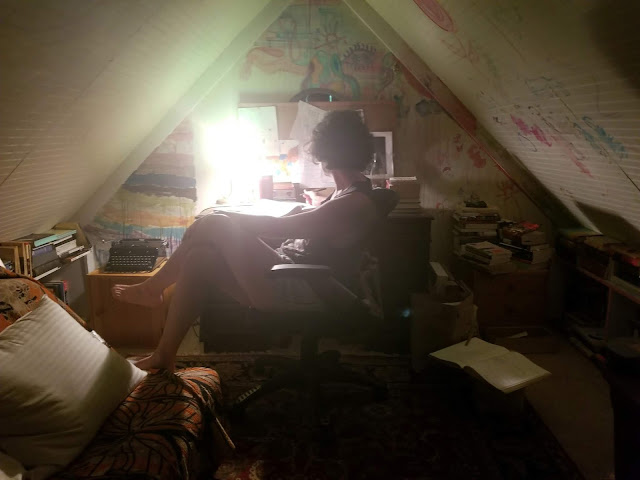































Comments